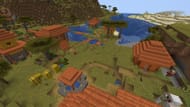Villagers are a vital part of Minecraft. They offer trading opportunities and a dynamic way to interact with your world. The essential aspects of these mobs, such as their professions, trading mechanics, and gossip systems, add depth to the game and present opportunities to maximize your resources.
Here are some of the most basic things you should know about villagers in Minecraft.
6 things you must know about Minecraft villagers
1) Villager professions

Chart New Territories with the ultimate Minecraft Seed Generator!
Except for nitwits, Minecraft villagers have professions that are indicated by their clothing and the titles in the trading interface. Professions are assigned based on claimed job site blocks, such as a lectern for librarians or a composter for farmers. Once a villager trades with a player, their profession becomes permanent.
A job site block must be unclaimed and exist within a village boundary to assign a profession. If a villager’s job site block is removed, they become unemployed unless they’ve previously traded with a player.
2) Trading and emerald farming

Villagers are primarily used for trading. You can sell them items like rotten flesh, crops, or iron ingots to obtain emeralds, which can then be used to buy valuable items. For example, clerics accept rotten flesh, and farmers trade crops for emeralds. Trading with villagers is often a faster and more reliable way to collect resources than traditional methods.
Librarians are especially valuable because they sell enchanted books. Enchantments like Mending and Unbreaking can significantly improve your tools and armor. Building a trading hall with villagers can streamline this process, allowing you to access the items you need quickly.
3) Villager's schedule

Villagers follow set schedules based on their age and employment status. Employed villagers spend much of their day at their job site blocks, occasionally wandering nearby. Unemployed villagers and nitwits wander throughout the village most of the day. Meanwhile, baby villagers playfully chase each other and race around.
At sunset, villagers return to their beds and stay there until morning. Villagers’ schedules are influenced by external factors. Rain or nearby hostile mobs can disrupt their routines, causing them to seek shelter or flee.
4) Villager breeding

Villagers breed when certain conditions are met. In Minecraft Java Edition, breeding requires two willing villagers and an unclaimed bed within a 48-block radius. Willing villagers must have 12 food units in their inventory, such as bread or carrots. Breeding attempts succeed during the day and fail at night as villagers prioritize finding beds.
In Bedrock Edition, the village’s population determines if breeding can occur. The appearance of the baby villager depends on the biome. Breeding can create a sustainable population, ensuring you always have enough villagers for trading and other tasks.
5) Gossip system

Villagers share gossip, which affects their reputation with players. Positive actions, like trading or curing zombified villagers, improve reputation and lower trading prices. Negative actions, such as attacking villagers, spread bad gossip and increase prices. Gossips decay over time but influences iron golems.
If your reputation with nearby villagers falls to -100 or lower, naturally spawned iron golems will become hostile. The gossip system adds a layer of strategy to interacting with villagers.
Building a positive reputation can lead to significant discounts on trades, while negative actions can make trading more expensive.
6) Curing zombified villagers

Curing a zombie villager in Minecraft involves giving it the Weakness effect and feeding it a golden apple. After five minutes, it will transform back into a villager.
Cured villagers often offer discounted trades. The profession of the cured villager depends on its prior status as a zombie or is randomly assigned if it was player-spawned in Bedrock Edition.
Curing zombified villagers is an excellent way to build a trading hall. Discounts from cured villagers can make rare items more accessible, saving you time and resources.
Uncover new worlds with our Minecraft Seed Generator!

